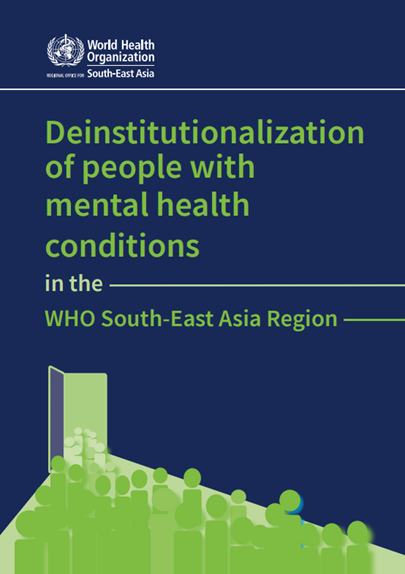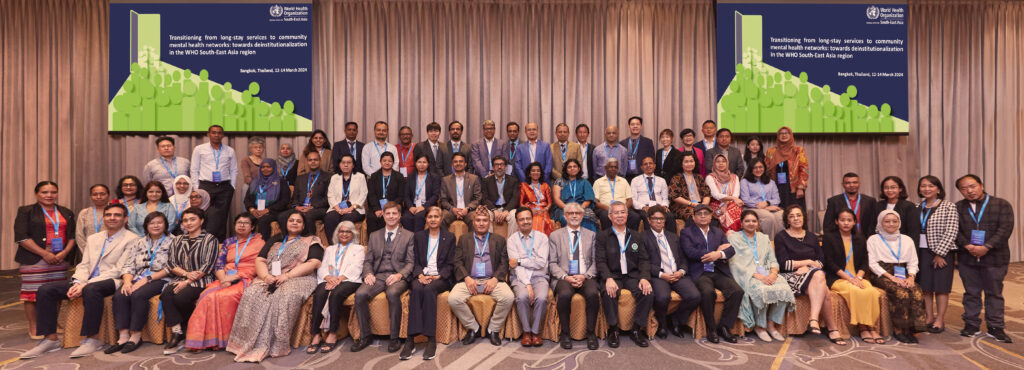We recently collaborated with the World Health Organization’s South-East Asian Regional Office (WHO-SEARO) to publish a report titled Deinstitutionalization of people with mental health conditions in the WHO South-East Asia Region. The report was officially released by Ms. Saima Wazed, Regional Director WHO South-East Asia at a regional meeting on ‘Transitioning from long-stay services to community mental health networks: towards deinstitutionalization in WHO South-East Asia Region’ in Bangkok on 12th March 2024.

Status of deinstitutionalization in the region
Deinstitutionalization (hereafter referred to as DI) is the process of shifting mental health care from psychiatric institutions to community-based services. DI emerged in the mid-1960s in response to calls to shut down psychiatric hospitals that were regarded as custodial institutions rife with human rights violations and segregation. The idea was to provide mental health services to people requiring psychosocial care close to their homes and within their communities.
Since then, DI has been regarded as a global mental health priority. However, the process has been slow and arduous, and has been met with resistance.
The report provides a comprehensive overview of the status of DI in the region across 11 Member States.
“This report can serve as a catalyst for change, igniting a process that results in every person leading a life of dignity, purpose, and fulfilment”
– Ms. Saima Wazed, Regional Director WHO South-East Asia
Institutional care remains the primary service model in many countries in the region such as India, Thailand and Indonesia. For smaller nations, specialized psychiatric hospitals do not feature prominently in mental health service delivery, however, there are concerns of eventually moving towards institutional services.
There are a total of 220 psychiatric institutions in the region, with India, Indonesia, and Thailand accounting for 93% of such facilities in the region. Bhutan, Timor-Leste, and Maldives have no such facilities and tertiary care is delivered through general hospitals with psychiatric wards.
Recent shifts focus on community-based services, with several countries moving towards deinstitutionalization supported by government policies and international conventions. A wide array of service delivery models is observed across the region ranging from long-term psychiatric institutions, psychiatric services in general hospitals to community-based mental health services and residential facilities. There was a significant disparity in the availability and resourcing of such facilities within each country, particularly community mental health care.
Deinsitutionalisation is a complex process that needs to be undertaken cautiously. It requires parallel development and investment in robust community-based mental health care systems. Multisectoral collaboration involving governments, private sectors, civil service organizations, and active participation of families, caregivers, and community members is imperative. Moreover, centering the voices and experiences of individuals with lived experiences is paramount to protect and promote rights for self-determination, autonomy, personal liberty, and independent living.
The report also highlights 'good practices' from diverse regions, offering insights for navigating the complexities of deinstitutionalization and fostering inclusive mental health care systems. The report outlines the factors that impact DI, provides strategies to prevent institutionalization and offers wide-ranging recommendations within policies and governance, service delivery, stakeholder engagement and advocacy as well as monitoring and research.
Regional meeting in Bangkok, Thailand
At the meeting in Bangkok, Ms. Wazed, in her virtual address, acknowledged the complex realities and unique contexts and challenges of each country in the region towards deinstitutionalization.
The meeting was attended by health officials, policymakers, researchers and lived experience experts. Over the three days, participants deliberated on challenges in their countries and the way forward for deinstitutionalization for improved mental health outcomes, community integration and human rights.

Authored by Tanya Nicole Fernandes, Research Fellow and Shubhda Sharma, Research Assistant at the Centre for Mental Health Law & Policy, Indian Law Society, Pune.
Faqs
1. What is deinstitutionalization in mental health?
Deinstitutionalization of mental health care is the process of shifting mental health care and support from long-stay psychiatric institutions to community mental health services. For centuries, psychiatric hospitals have been the primary model for delivering mental health services. Human rights violations and poor treatment have been extensively documented in such institutions. Over the past few decades, deinstitutionalization has gained global attention, with the growing push towards community-based mental health care. The “Trieste Model” in Italy has been an exemplar, paving the way for the adoption of deinstitutionalization practices across different contexts and settings.
2. How is deinstitutionalization impacting Southeast Asia?
The adoption of the Paro Declaration by the Member States of the WHO South-East Asia Region in 2022 was a major development in the Region. The Paro Declaration commits Member States to achieving universal access to people-centred mental health care and services, and to systematically planning for deinstitutionalization through a series of actions that include strengthening the capacity of primary care services to deliver mental health support, and developing community mental health networks. The declaration was followed by the Mental health action plan for the WHO South-East Asia Region 2023–2030, which aims to provide comprehensive, integrated and responsive mental health and social care services in community-based settings.
